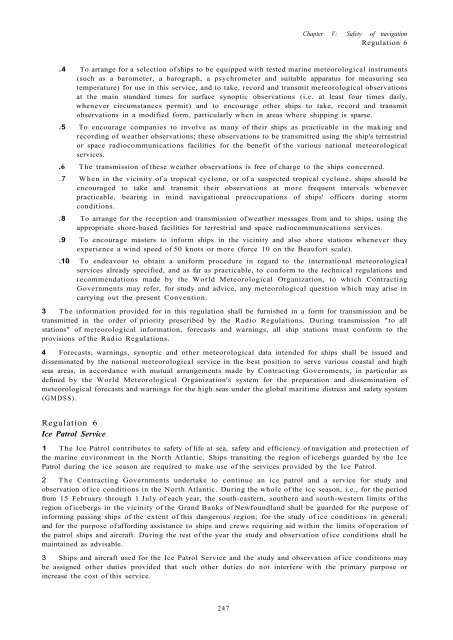Solas Consolidated Edition 2009.pdf
Solas Consolidated Edition 2009 for maritime
Solas Consolidated Edition 2009 for maritime
Create successful ePaper yourself
Turn your PDF publications into a flip-book with our unique Google optimized e-Paper software.
Chapter V: Safety of navigation<br />
Regulation 6<br />
.4 To arrange for a selection of ships to be equipped with tested marine meteorological instruments<br />
(such as a barometer, a barograph, a psychrometer and suitable apparatus for measuring sea<br />
temperature) for use in this service, and to take, record and transmit meteorological observations<br />
at the main standard times for surface synoptic observations (i.e. at least four times daily,<br />
whenever circumstances permit) and to encourage other ships to take, record and transmit<br />
observations in a modified form, particularly when in areas where shipping is sparse.<br />
.5 To encourage companies to involve as many of their ships as practicable in the making and<br />
recording of weather observations; these observations to be transmitted using the ship's terrestrial<br />
or space radiocommunications facilities for the benefit of the various national meteorological<br />
services.<br />
.6 The transmission of these weather observations is free of charge to the ships concerned.<br />
.7 When in the vicinity of a tropical cyclone, or of a suspected tropical cyclone, ships should be<br />
encouraged to take and transmit their observations at more frequent intervals whenever<br />
practicable, bearing in mind navigational preoccupations of ships' officers during storm<br />
conditions.<br />
.8 To arrange for the reception and transmission of weather messages from and to ships, using the<br />
appropriate shore-based facilities for terrestrial and space radiocommunications services.<br />
.9 To encourage masters to inform ships in the vicinity and also shore stations whenever they<br />
experience a wind speed of 50 knots or more (force 10 on the Beaufort scale).<br />
.10 To endeavour to obtain a uniform procedure in regard to the international meteorological<br />
services already specified, and as far as practicable, to conform to the technical regulations and<br />
recommendations made by the World Meteorological Organization, to which Contracting<br />
Governments may refer, for study and advice, any meteorological question which may arise in<br />
carrying out the present Convention.<br />
3 The information provided for in this regulation shall be furnished in a form for transmission and be<br />
transmitted in the order of priority prescribed by the Radio Regulations. During transmission "to all<br />
stations" of meteorological information, forecasts and warnings, all ship stations must conform to the<br />
provisions of the Radio Regulations.<br />
4 Forecasts, warnings, synoptic and other meteorological data intended for ships shall be issued and<br />
disseminated by the national meteorological service in the best position to serve various coastal and high<br />
seas areas, in accordance with mutual arrangements made by Contracting Governments, in particular as<br />
defined by the World Meteorological Organization's system for the preparation and dissemination of<br />
meteorological forecasts and warnings for the high seas under the global maritime distress and safety system<br />
(GMDSS).<br />
Regulation 6<br />
Ice Patrol Service<br />
1 The Ice Patrol contributes to safety of life at sea, safety and efficiency of navigation and protection of<br />
the marine environment in the North Atlantic. Ships transiting the region of icebergs guarded by the Ice<br />
Patrol during the ice season are required to make use of the services provided by the Ice Patrol.<br />
2 The Contracting Governments undertake to continue an ice patrol and a service for study and<br />
observation of ice conditions in the North Atlantic. During the whole of the ice season, i.e., for the period<br />
from 15 February through 1 July of each year, the south-eastern, southern and south-western limits of the<br />
region of icebergs in the vicinity of the Grand Banks of Newfoundland shall be guarded for the purpose of<br />
informing passing ships of the extent of this dangerous region; for the study of ice conditions in general;<br />
and for the purpose of affording assistance to ships and crews requiring aid within the limits of operation of<br />
the patrol ships and aircraft. During the rest of the year the study and observation of ice conditions shall be<br />
maintained as advisable.<br />
3 Ships and aircraft used for the Ice Patrol Service and the study and observation of ice conditions may<br />
be assigned other duties provided that such other duties do not interfere with the primary purpose or<br />
increase the cost of this service.<br />
247


